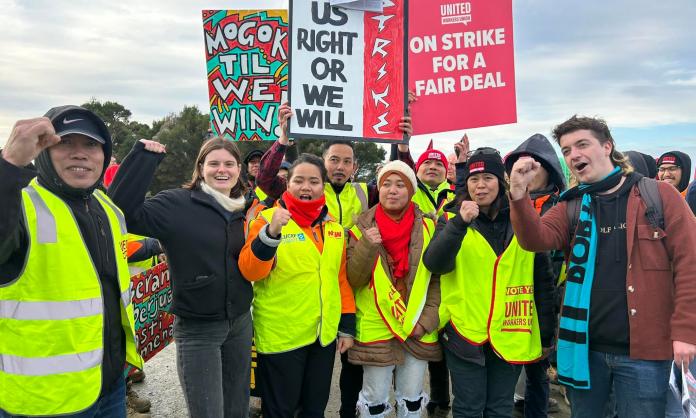“I’m not your mate and you need to move.” It was pitch black, cold and barely 5.30am at the Hussey & Co. packing factory in Pearcedale, south-east of Melbourne. The workers had just blocked their first vehicle from entering.
The manager was furious. He came out, calling the workers “parasites”. But there was nothing he could do. The employees decided that if managers wanted to enter the site, they would have to walk through the mud. And for the rest of the day, as the managers entered and exited, they were met with jeers and chants of “Union power!” and “Mogok till we win!” (Mogok means “strike” in Bahasa.)
Workers at Hussey, a producer of baby leaf vegetables, made history on 28 June. The women, predominantly migrants from Malaysia, Indonesia, Cambodia and Burma, led the first strike in the company’s history, and the first protected industrial action in the farm industry for generations. Within 24 hours, they brought the company to its knees and scored a decisive victory.
The United Workers Union began organising at the company in 2017. Almost all the workers were employed through contractors and were paid in cash—often as little as $13 an hour. One worker had died in a car crash after reportedly being forced to work a 20-hour shift.
The union won an end to cash-in-hand payments, stopped the contracting and negotiated an enterprise agreement. Now, workers demanded wage increases linked to inflation, weekend penalty rates, the same pay as labour hire and better union rights.
Management’s counteroffer? An extra 6 cents an hour.
The unionists weren’t taking it. Workers told Red Flag about the twelve-hour shifts with only two half-hour breaks. Some, if they were unlucky, would start at 6am, be forced to take a break at 7am and then work the next ten hours straight. They spoke about the back pain caused by being told to work faster, packing 100 boxes per minute into a pallet.
We all linked arms when a truck inside started and did a lap around the driveway. But it was forced to park again. This was the goal of the picket: no trucks in or out, no produce moved, and therefore no money made by the company.
A delegate who had been organising at Hussey for eight years related how she would go door to door to people’s homes after work, persuading them to join the union—crucial and persistent work that made the strike possible.
Some workers spoke about the difficulties of losing work for having the wrong visa, or the limbo of temporary visa status. Was it a problem for the organising effort? No—when enough workers are involved there’s little the managers can do about the visas. And it helped that the four delegates between them can converse in all the main languages spoken at the site.
At one point, Jeremy Haw, the owner, was standing in a group of angry suited men chatting with the police. The cops later decided to try to escort the truck off the property. They told the workers that their picket was illegal. But the workers didn’t budge. The police were powerless to move the truck, and nothing was moved past the picket the whole day.
“They’re jeopardising our entire business. We can’t get any stock in or out. Trucks are just sitting there”, Haw complained to a Financial Review journalist. The picket ruined Hussey’s ability to make money.
So, on the first night of the indefinite strike, management folded. The workers won a 6.5 percent pay increase for the first year, then an additional 1 percent over the annual Fair Work pay determination every year after. They won all union rights, a veto on labour hire, and weekend penalty rates—a rare win in the farm industry.
At a time when many workers’ conditions are going backwards, the workers at Hussey have shown that, by fighting, we can win. They also showed that super-exploited migrant women workers are far from mere victims. They are leading the way, showing workers everywhere how to win.
“What ‘parasite’ means is eating from the home without doing anything, just taking advantage from the home”, one worker reflected on the manager’s earlier insult. “But we are the ones who are working—he is the parasite. He is eating from us.”
The workers at Hussey achieved a small but important victory against a parasitic system.










